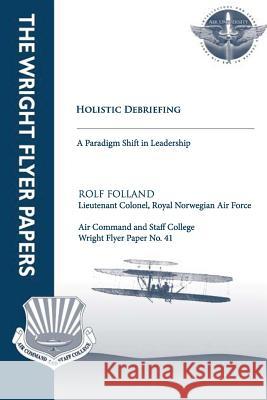Holistic Debriefing - A Paradigm Shift in Leadership: Wright Flyer Paper No. 41 » książka
Holistic Debriefing - A Paradigm Shift in Leadership: Wright Flyer Paper No. 41
ISBN-13: 9781479200078 / Angielski / Miękka / 2012 / 40 str.
From time to time, paradigm shifts occur in leadership in the sense that fundamental assumptions about the mechanisms of human performance change. We are currently undergoing a paradigm shift that might highlight transformational leadership as highly effective in the context of military operations. The reason is that transformational leadership facilitates the growth of motivational mechanisms when confronting extreme situations like war. In essence, military subordinates expect their leaders to have more interpersonal skills than were required before. This is partly a result of the shift in community wherein employers now are expected to take responsibility for individuals' lifelong personal growth and partly a result of increased stress due to higher demands in international operations. This paper explores the utility of a debriefing method resulting in individual, unit, and organizational transcendence toward increased effectiveness in the Royal Norwegian Air Force (RNoAF). The conceptual framework is centered on the transformational and complexity theories of leadership science. The study offers for consideration a debriefing methodology termed "holistic" as a structure for achieving both individualistic and unit inner growth and efficiency. The problem examined is the lack of proper leadership tools in the RNoAF's operational units to understand and cope with the effects of increased stress. Based on theory and examples from operational practice, holistic debriefing is presented as a possible means for leaders to increase mission effectiveness through improved stress coping mechanisms. The secondary effects from people engaging with themselves and each other through holistic debriefing are increased self-knowledge, interpersonal trust, group confidence, and an improved working environment.
Zawartość książki może nie spełniać oczekiwań – reklamacje nie obejmują treści, która mogła nie być redakcyjnie ani merytorycznie opracowana.











